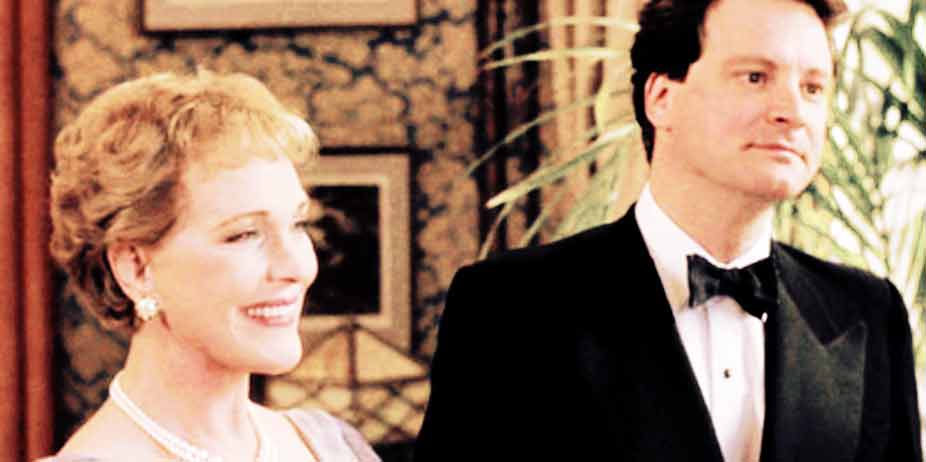Based on the Broadway play of the same name, Relative Values is a quirky,
intelligent comedy that mocks aristocracy, upper-crest British life, and family
engagements. It has no grand conclusion and no moral value. But that doesn't
matter. The audience is having so much fun, who cares? Movies can be excellent
mood-lifters, and this one is guaranteed to bring a smile to the most dour face.
Relative Values is a lot of fun. The casting is great, and for a cable
production the quality of filmmaking is above reproach. Best of all, it's a
movie with only a few profanities, making it excellent for a family movie night.
Don Lucas (William Baldwin) and Miranda Frayle (Jeanne Tripplehorn) are
the hottest couple in 1950's Hollywood. Having met over the casting of a
new romantic war epic, the pair immediately fell in love. The tabloids
love it. The fans love it. The stars love it. Until something goes
seriously wrong and Miranda feels it's time for a "vacation" away from
her charming co-star. She packs a bag for London and flies halfway
around the world, leaving Don devastated. That's when the news hits the
fan. Miranda is seeing a British Earl by the name of Nigel Marshwood
(Edward Atterton). Her hundreds of thousands of fans are traumatized.
Don is traumatized. Marshwood's mother is traumatized. Her only
son had decades of English aristocracy flowing through his blood and
he's about to marry "a trumped-up Colonel floozy."
Lady Marshwood's troublemaking nephew Peter Ingleton (Colin Firth) is
determined to get to the bottom of it. Crestwell (Stephen Frye), the
head butler in the rambling old manor house, is fed up with the romantic
babblings of the housemaids, who collect Lucas/Frayle memorabilia and
spend their free time mooning over cinematic romances. But it's Moxie
(Sophie Thompson), Lady Marshwood's personal maid, who seems the most
affected by the news. Desiring to leave Lady Marshwood's employment,
she's coerced into telling the truth. Miranda is Moxie's younger sister.
They had a falling-out when the girls were young, and Miranda flounced
off to America with a seedy film agent, leaving Moxie to care for their
aging mother. Unable to bear the thought of Moxie leaving, Lady
Marshwood and Crestwell come up with the perfect plan... to pass Moxie
off as a wealthy socialite. Miranda need never know the truth, and Nigel
can be convinced she's come into an inheritance. But, in the words of
Crestwell, "there's a social time bomb just waiting to go off
upstairs."
Miranda hasn't seen her sister in a number of years, but have they truly
changed that much? And what about Miranda's co-star and ex-lover, Don Lucas,
who has just stormed off the set of his newest film and flown mysteriously
to England? Will this marriage ever come off successfully, or does the
future mother-in-law have a few tricks up her aristocratic sleeve? When I
first came across this film, two things persuaded me it was a must-see.
Julie Andrews and Colin Firth. The rest of the cast, a perfect wrap of
British actors and a few Hollywood biggies, make it twice the fun. I found
myself howling throughout at the clever puns, wordplays, and British satire.
If you're a fan of wit in the style of Wilde, you'll find this film as
likable as his masterpieces. In some respects, it's even funnier.
The English maids who eavesdrop in corridors, only to fall flat on their
faces when the door suddenly comes open. Moxie being so stressed she gets
completely drunk over dinner. Crestwell's memorable dialogue with Don Lucas,
who doesn't understand a word of upper-class English. Then there are the
screaming girl-guides at the front gate and Colin Firth's hysterical role as
an intentional troublemaker.
Julie Andrews is fantastic in her role as the scheming Lady Marshwood.
This is her most convincing and likable role since The Princess
Diaries, and she carries it off with the appropriate irony and
flair. She's actually quite a good humor actress, something difficult to
perceive if you've only ever seen her Maria von Trapp. Sophie Thompson
is the real gem here, overshadowing her costars with an incredibly
humorous maid-turned-socialite who finally blows her fuse. Colin Firth
arguably has some of the finest lines, and can barely keep a straight
face through the whole thing. The cast give the impression they were
having a fantastic time filming, and as a result the audience is swept
up in their shenanigans without a thought for consequence. Though the
film has minor flaws, it's unable to overshadow the clear-cut humor and
deep irony of the piece.
Two exclamations of GD and a few mild profanities pepper the script. Miranda
and Nigel share the same hotel room, kiss romantically a few times, and make
all appearances of intimacy without subjecting us to graphic content. Moxie
implies in an outburst that Miranda's agent only "wanted one thing." There's
also many scenes of people in various stages of drunkenness, which some
viewers might find offensive. Peter has a very limp wrist but the film never
outlines whether he's just mischievous or tends toward effeminate. I've
gotten so sadly used to movies wrought with innuendo that this is a welcome
change. Not for everyone, but my family enjoyed this fun-filled romp through
English satire thoroughly. And that's saying something.
 Relative
Values (2000)
Relative
Values (2000)
